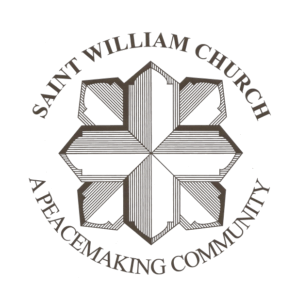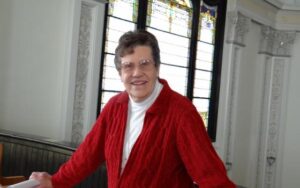Communion: Reflecting on Reception, Controversies, and Synodal Experiences

Picture by Mariana C. for cathopic.com
As our DD delegation made a pilgrimage to Rome last October to witness the opening of the Synod by participating in the opening Mass, we arrived early to St. Peter’s Cathedral, like good Catholics – ready to get our seats up close!
Individual chairs were spaced with some distance apart both in front and in back, as well as to the right and left.
We chatted with others around us in the usual pre-mass bustle – I discovered I was a few seats away from RSCJ sisters who promptly invited me to the Mother house for lunch (I am a proud alumna of the Sacred Heart – St. Madeline Sophie, pray for us today on your Feast Day)
It was a solemn, beautiful liturgy. I strained to the outer edge of my Spanish language skills during Pope Francis’ homily – but was able to make out key words which have since illuminated my steps: encounter, listen, discern.
As a proper army of priests were dispatched to bring communion to us, each was accompanied by an usher whose role is both to help guide the priest, and also to ensure that eager mass goers do actually receive the host, and not tuck it away as a souvenir of their trip to Rome.
The young priest approached one member of our delegation, seated two seats in front of me. As she put her hand out to receive, he gestured to the mouth, and she affirmed her hands, open and ready. He shook his head, and passed by without offering her communion.
He was then met with the next member in our delegation, who similarly had her hands presented to receive. The usher, at this point, whispered in the priest’s ear – and he relented, offering communion in the hand – and then stepping back to give communion to the woman he’d previously passed over.
In the moment I was filled with rage: Are we somehow unworthy to receive because we are offering our hands, and not our tongues? Who is this minister of the Eucharist to decide? What training or messages is he receiving that allow him to determine who can and cannot receive, and in which manner?
A few Jesuits and women religious approached us after the Mass – having witnessed what just unfolded. They apologized, and were interested in getting to know us. Being seen in this encounter was itself a gift – and it softened my anger, helped me have a bit more charity for this young priest who may have been nervous or anxious.
~
I would agree that people do need to be formed to receive. It’s a way we as a faith community take responsibility for accompanying one another as disciples in the faith. Having walked my own children through the process, and served as a catechist preparing children for First Communion – it is important they know to approach the altar with reverence. This reverence holds a container for them to live into a deepening belief that it really is JESUS who wants to be so near and close to them as to become bread, to nourish. I also trust that this is a mystery which may take a whole life to fully embody and embrace.
As news of the politics of communion picks up again here in the US Church, I’m reminded anew of this encounter we had in Rome. I see what is at stake in the life of our Church and our full reception of the gift of communion, the gift of Christ’s body, the outpouring of the Spirit in which we share in this one body in the world.
I welcome a eucharistic revival – agree that it is needed. I welcome a renewed belief in the radical interconnectedness of our lives. That in fact we are not individuals on an island, but creatures deeply socially interwoven – mysteriously bound together.
And this is where the actual messy beautiful process of synodality offers us a gift.
The synod is a gift offered for our fragmented and divided world. A path of invitation in our walk as a people fed by Eucharist. An invitation to radically embrace the hospitality that is constitutive of our Biblical tradition, and be guided by a vision for an inclusive heavenly banquet where we do not determine the guest list.
In Discerning Deacon’s national consultation held just over a week ago, I had the gift of being in a space of Spirit-filled communion with a group of 5 people that were complete strangers to me and to one another. Having been guided in an examen which prompted us to reflect on our walk of faith, we asked the fundamental question of the synod.
Participants shared their journeys: the deep joys of accompanying God’s people as ministers; the witness others gave that to follow Jesus is to practice the art of accompaniment; experience with ministry immersed with indigenous communities where there is much to learn and appreciate about inculturation over a colonizing view of evangelization; how ministry must be more than a sacramental dispensary; the joy of witnessing the wildness of the Holy Spirit at work in people’s real lives; a shared sense nourishment at the table of the Eucharist, which inspires us to open up tables to feed those who are hungry, in need of company and a nourishing meal.
The circle was deeply synodal and profoundly diaconal in its orientation towards serving the people of God. Each individual was rooted in a love of Jesus and of his Church in the world.
As I have continued to reflect on the 70 minutes we shared together, I count it as a lived experience of communion. Across our disparate geographies (we hailed from Canada, Alaska, Miami, Philadelphia and Durham) – there was a communion we shared, a consensus found in the Spirit, a sense of belonging to the same Body and each having something to contribute as well as to receive.
Friends: take heart. Pentecost is around the corner. The Spirit is still at the helm, animating and renewing the heart of the Church. The Synod is but an excuse to enter into this mystery – as we turn to each other, open to what new life will spring forth, poured out upon all flesh, as we listen deeply to the dreams of our elders and the visions of our youth.


